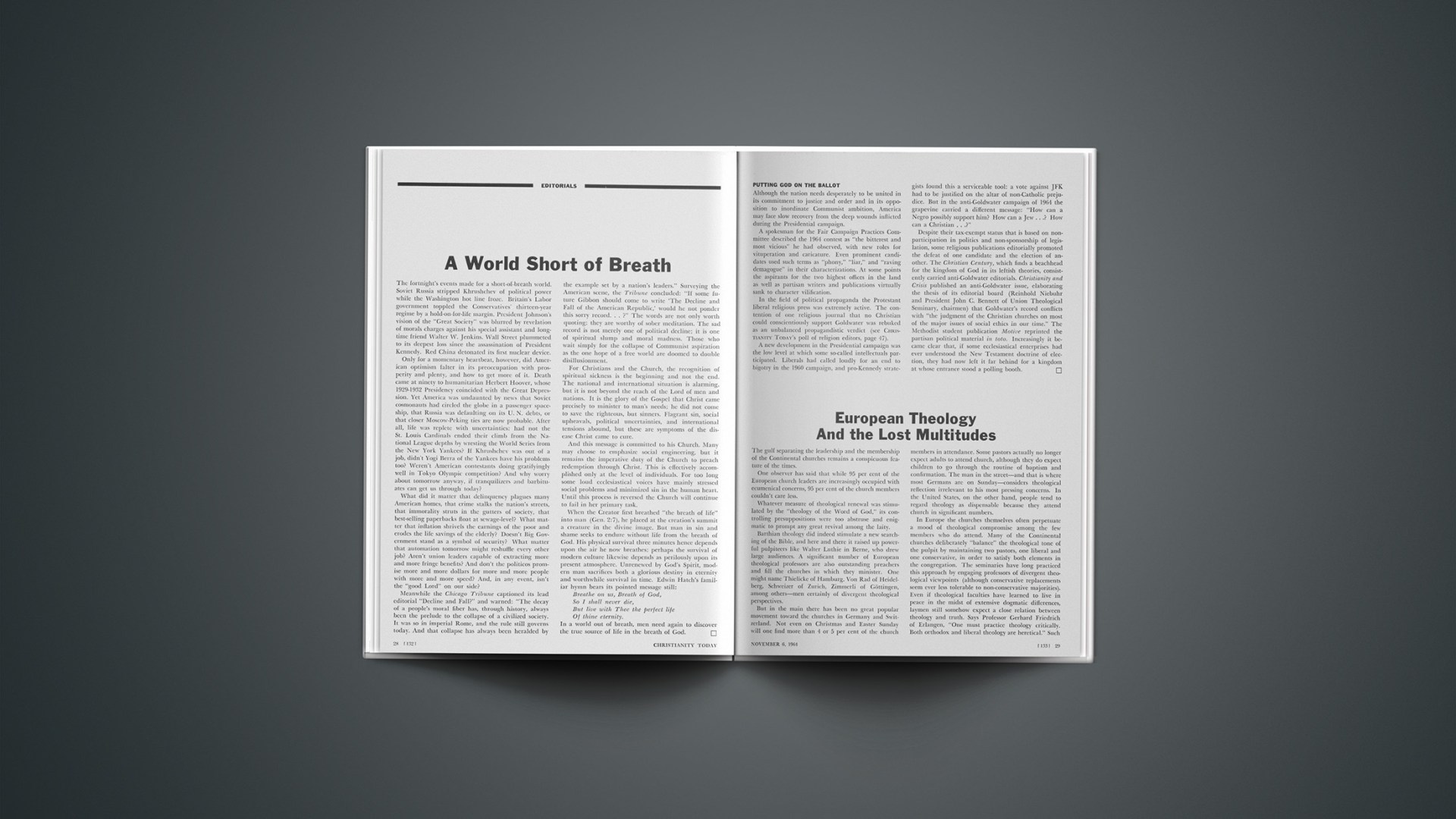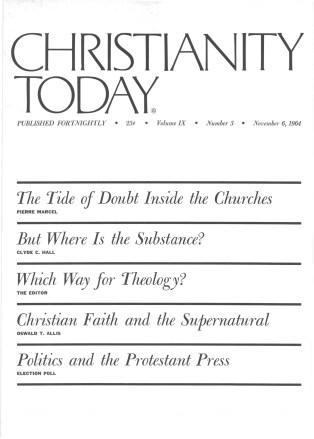The gulf separating the leadership and the membership of the Continental churches remains a conspicuous feature of the times.
One observer has said that while 95 per cent of the European church leaders are increasingly occupied with ecumenical concerns, 95 per cent of the church members couldn’t care less.
Whatever measure of theological renewal was stimulated by the “theology of the Word of God,” its controlling presuppositions were too abstruse and enigmatic to prompt any great revival among the laity.
Barthian theology did indeed stimulate a new searching of the Bible, and here and there it raised up powerful pulpiteers like Walter Luthie in Berne, who drew large audiences. A significant number of European theological professors are also outstanding preachers and fill the churches in which they minister. One might name Thielicke of Hamburg, Von Rad of Heidelberg, Schweizer of Zurich, Zimmerli of Göttingen, among others—men certainly of divergent theological perspectives.
But in the main there has been no great popular movement toward the churches in Germany and Switzerland. Not even on Christmas and Easter Sunday will one find more than 4 or 5 per cent of the church members in attendance. Some pastors actually no longer expect adults to attend church, although they do expect children to go through the routine of baptism and confirmation. The man in the street—and that is where most Germans are on Sunday—considers theological reflection irrelevant to his most pressing concerns. In the United States, on the other hand, people tend to regard theology as dispensable because they attend church in significant numbers.
In Europe the churches themselves often perpetuate a mood of theological compromise among the few members who do attend. Many of the Continental churches deliberately “balance” the theological tone of the pulpit by maintaining two pastors, one liberal and one conservative, in order to satisfy both elements in the congregation. The seminaries have long practiced this approach by engaging professors of divergent theological viewpoints (although conservative replacements seem ever less tolerable to non-conservative majorities). Even if theological faculties have learned to live in peace in the midst of extensive dogmatic differences, laymen still somehow expect a close relation between theology and truth. Says Professor Gerhard Friedrich of Erlangen, “One must practice theology critically. Both orthodox and liberal theology are heretical.” Such a comment, while it may not startle a seminary campus, is upsetting enough for the man in the pew to make him cast all theology aside.
One disturbing factor in this confused and spiritually moribund situation is that seminary faculties seem to cultivate theology “for its own sake.” Professors often insist that they are training theologians, not pastors. Thus the chronic separation of church and theology continues and worsens. Increasingly distressed over this condition, some Lutheran bishops want seminary faculties to be more answerable to their bishops. But such a prospect the university-related faculties regard as intolerable.
With most of the people “in the Church” but few of them “in the churches,” the spiritual condition on the Continent is especially dark because of the widespread skepticism that there really is a Word of God that the Church must proclaim. Theology and Church, after all, must stand in some sort of reciprocal relation. And in the present situation the masses consider church attendance just another fragmentation of their time. Lutheran Bishop Hanns Lilje of Hannover has charged that Europe is no longer aware of the importance of the Bible in the conduct of human affairs; even a “simple knowledge” of the Bible, he says, is fast disappearing from European life. He is convinced of the connection between the contemporary theological situation and the breakdown of interest in Scripture: the current trend of European biblical scholarship, he insists, has “made the Bible appear to be uncertain of its message.” Nor is the Bible being read in a great many homes in Germany. Yet, as Norbert Rückert of Nürnberg comments, “while the Bible is widely neglected in Protestant circles, the Roman Catholic Church has undertaken to promote a Bible-revival.”
What is more, Bultmann’s aim to accommodate Christianity to the modern scientific mind by demiracleizing the Gospels has not succeeded. In point of fact, he has diverted more young theologians from biblical Christianity than he has won scientists to Christian faith. It is remarkable that among graduate students in Germany one can hear students even of Missouri Synod background contend that in every generation the Church needs a heretic like Bultmann to speak “for faith” to those outside its orbit. Yet the lamentable gulf between European scientists and theologians remains and has not been spanned by theological obeisance to scientific naturalism. The movement away from miracles is still mainly a movement away from the Church as well. Growing disbelief in miraculous Christianity may be assumed in the Church Free Society’s claim to have liberated its almost 100,000 members from “the Church and its dogmas.” The society seeks “independently thinking people” who now “belong to a church and cultural association only because of inherited custom and family tradition.”
No doubt many persons who lack vital personal faith are found in Continental churches that automatically incorporate children into their membership. But it is specious to argue from this situation that Christian realities lack any sure foundation and that science brings freedom while the faith of the Church means bondage, and to convey the impression that modern science and an atheistic world view demand each other. Yet for a generation the premise that the Christian Gospel requires no break whatever with a naturalistic view of science and history has had the enthusiastic support of Bultmannian theology. The Church Free Society sponsors public lectures promoting an atheistic Weltanschauung, holds independent marriage, confirmation, and children’s dedication ceremonies, and substitutes a light or sun-festival on December 21 for the Christian celebration of Christmas.
In surveying the theological situation in Europe, one is left, therefore, with some clear impressions.
European Protestant theology has neither closed nor bridged the wide gap between the churches and the masses. The broad disagreements of the dogmaticians support the general opinion that theology is a matter of specialized speculation. Efforts to attract the intellectuals by diluting the Gospel have failed; Bultmann’s demythology has won few existential philosophers from Heidegger’s atheistic camp and few naturalistic scientists; moreover, those who have been influenced have yet to be won to biblical Christianity. The common people find theology too abstract and unclear for profitable reading, and church attendance they regard as sadly unrewarding. That no one norm any longer controls the climate of conviction in the seminaries is widely reflected in the pulpits, and the well-known tendency of the professionals to compromise the Scriptures as the rule of faith and life discourages Bible reading among the laity. While the Swedish theologians think that the whole notion of a normative theology should be discarded, most confessional theologians believe that without normative theology the Church would go into bankruptcy.
But then again the ecumenical development is convinced that the assorted denominational confessions by which the disunity of Christendom is perpetuated cannot all be true. The resultant interest in the ecumenical movement, therefore, is supra-confessional and theologically inclusive, yet at the same time wistfully normative. Any theological norm for the ecumenical development, it now seems, will be ecclesiastically decided rather than biblically determined. The World Council of Churches, which has already forsaken its pan-Protestant character for a merged Protestant-Orthodox image, is moving into conversations with Rome at a time when the council lacks a clear theological norm and when many Protestant dogmaticians reject a Bible-bound theology. Protestant participation in the dialogue with Rome is driven forward not so much by confident theological consensus and conviction as by an exasperating lack of such concurrence, and by the secret and perhaps strange hope that larger ecumenical conversations will shape a new unity in which Protestant consciousness can survive unhindered.
Washington And Crime
The spacious city of Washington with its broad streets, lovely parks, and great public buildings seems an incongruous setting for violence. Yet for years, going back in fact through the administrations of both political parties, crime in Washington has been mounting alarmingly. The capital is not the worst offender in crimes committed and growth of lawlessness year by year. Yet it is third in rate of criminality and fourth in the increase of crime since 1960.
Such crime is no respecter of persons. It has struck this fall at the daughter of a cabinet officer who was robbed one night at pistol point outside her home. Recently it struck again at noon of a beautiful autumn day on the C. & O. Canal towpath beside the Potomac, where the murder victim, a talented artist, had often walked with her friend, Mrs. Jacqueline Kennedy.
Washington belongs to all the people. Because it is a federal district, its government, the heads of which are appointed by the President, is responsible to Congress. Its population is mushrooming, its slums grievous, its color complex changing, its education inadequate. School children and other tourists from all over the country and from foreign lands rarely encounter crime in the sections they visit, but they know from newspapers about crime in Washington. Americans have a right to expect from their capital a better example. The most powerful government on earth runs the sixty-one square miles of the District of Columbia; yet crime in the showcase of the nation is rampant—a dramatic illustration of the ineffectiveness of government to root out violence.
Baptists And Their Witness
The American Baptist publication Crusader (October, 1964, issue) published a statement drawn up by theologians representing six of the seven Baptist bodies participating in the five-year Baptist Jubilee advance. In many respects it is a worthy statement; in some, disappointing. The Bible is assigned “authority in all matters of faith and practice,” while the authority of Christ is simultaneously disjoined from the authority of the Bible: “There is great diversity among us in regard to … the precise way in which Scripture is understood in the light of the final authority of Christ Himself.” It is significant that recent modern theology has attempted to justify its departures from Scripture by an appeal to some independent principle.
Under the heading “Salvation for All or for Some Only,” the document evades a frontal statement on universalism. It states that “differences of understanding concerning eternal punishment and the possible salvation of all men have marked Baptists throughout their history.” What history is alluded to is not at all clear.
One thing is certain. Baptist confessions of faith deal definitively with the question of universalism. The major confessions, such as the Mennonite, the Calvinistic, and the Arminian ones in England, and the New Hampshire and Philadelphia confessions as well, speak of a final judgment and consignment of the wicked dead to endless punishment. It is to be hoped that future discussions will bring the Baptist witness into line with the major confessions of their forebears and with the New Testament teaching as the norm of faith.










